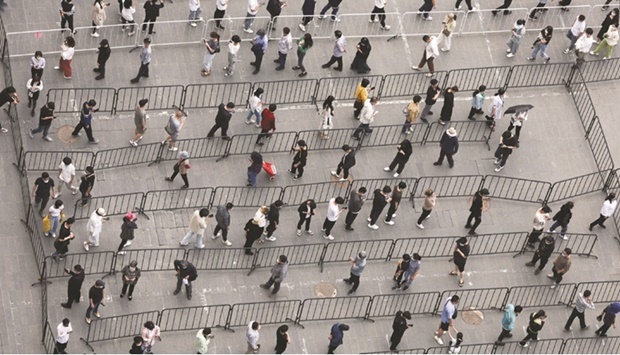A mass Covid-19 testing order in Beijing’s biggest district prompted residents in the Chinese capital to stock up on groceries, fearing they could be destined for a lockdown similar to that of Shanghai, which entered a fourth week of bitter isolation.
Authorities in Chaoyang, home to 3.45mn people, late on Sunday ordered those who live and work there to be tested three times this week as Beijing warned the virus had “stealthily” spread for about a week before being detected.
Knowing how Shanghai residents struggled to source food and other essentials while locked indoors, shoppers in Beijing crowded stores and online platforms to stock up on vegetables, fresh meat, instant noodles and toilet paper.
A 63-year-old Chaoyang resident, Di, bought two bags of vegetables — enough for eight-10 days, he said — just in case his building is added to more than a dozen put under lockdown.
“Shanghai was a lesson,” he said, adding that he doesn’t believe Beijing will suffer the same fate.
In the financial hub, the lack of enough couriers to make deliveries to homes has been the main supply bottleneck, fuelling widespread anxiety and anger.
In Beijing, supermarket chains including Carrefour and Wumart said they had more than doubled inventories, while Meituan’s grocery-focused e-commerce platform increased stocks and the number of staff for sorting and delivery, state-backed Beijing Daily reported.
China stocks slumped to two-year lows on worries of a potential Beijing outbreak.
Research by Gavekal Dragonomics published on Friday estimated that out of China’s top 100 cities by economic output, 57 had “relatively tough” Covid-19 restrictions in place last week, down from 66 the week before.
Beijing’s case load is small compared with those globally and the hundreds of thousands in Shanghai.
Most Chaoyang schools, stores and offices remained open.
The district is home to many wealthy residents, most foreign embassies as well as entertainment venues and corporate headquarters.
It has little manufacturing.
In Shanghai, draconian restrictions were still enforced widely across the city, but officials raised hopes of some respite by saying they would look into reserving the harshest curbs for smaller areas around confirmed cases.
“Every compound, every gate, every door must be strictly managed,” Qi Keping, vice-head of Shanghai’s northeastern commercial district of Yangpu, told a daily news conference, describing the new, more targeted approach, and saying it would “better achieve differentiated prevention”.
Over the weekend, authorities sealed off entrances of many public housing blocks and even entire streets with two-metre-tall green wire mesh fences, with videos online showing residents protesting from their balconies as frustration reached new heights among the city’s 25mn residents.
Police in hazmat suits have been patrolling the streets, setting up road blocks and asking pedestrians to go home.

Residents line up at a makeshift nucleic acid testing site during a mass testing for Covid-19 following the outbreak, in Beijing, China, yesterday.
